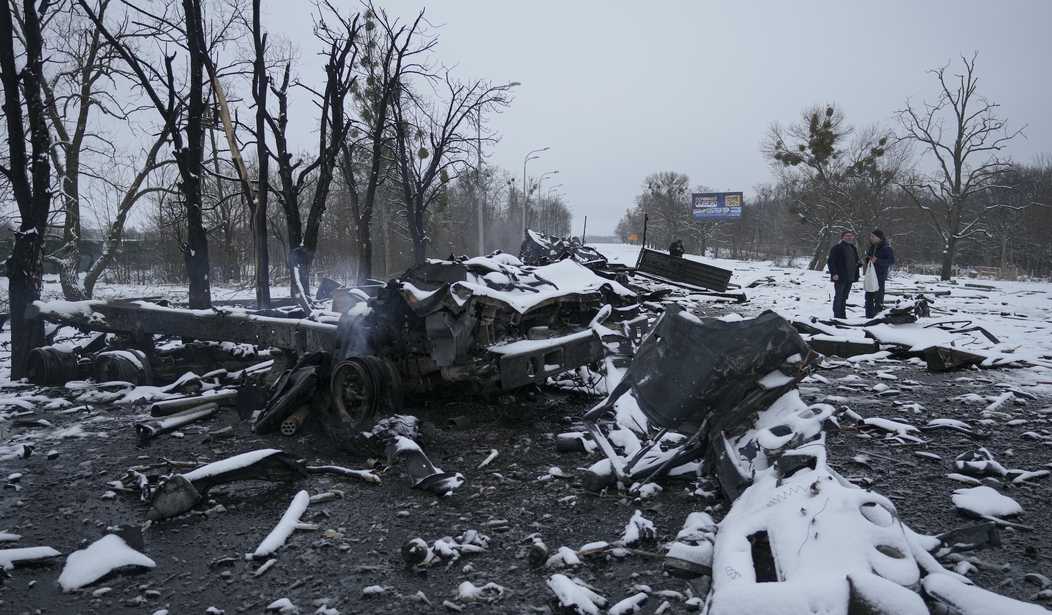On Tuesday, Stephen Green pointed out the curious case of the missing Russian air force. Quoting military researcher Justin Bronk, Green writes, “Bronk argues that ‘the continued pattern of activity’ (or should that be inactivity?) suggests that ‘the VKS lacks the institutional capacity to plan, brief and fly complex air operations at scale.'” (Author’s Emphasis)
If true — and we can certainly surmise that Vladimir Putin didn’t have a “road to Damascus” moment and is refraining from unleashing the VKS out of pity — this suggests that all is not well with the huge Russian military.
By some reports, Russia has lost between 4,000 and 11,000 soldiers. They may not all be casualties of war. There are numerous reports of wholesale Russian desertions from the poorly trained and cruelly led conscript army.
There are also reports of Russian soldiers shooting soldiers who refuse to open fire on civilians. Since we can’t believe all of these reports and have no way of knowing which — if any — are true, it’s best just to add them to the mosaic of information that awaits further proof.
What we can be sure of at this point is that the Russian military is underperforming compared to their actions in Georgia and Crimea and it’s doubtful they can recover in time to impact their performance in this war.
Make no mistake: Russia is in no danger of losing the war. But the longer the war goes on, the more the sanctions will bite — and bite hard.
Overall, the early days of the Russian invasion were characterized by small units moving on their own, without logistics support or air cover, getting into skirmishes with Ukrainian defenders. An example was a seemingly halfhearted attempt by small detachments of Russian forces to take Kharkiv, Ukraine’s second-largest city, in the first days of the war. This spread-out and haphazard approach was baffling to some of those who study Russian military tactics, which typically emphasize heavy artillery.
“From what we understand, or what we thought we understood, about Russian doctrine, they’re doing everything wrong,” David Shlapak, a senior defense researcher at the Rand Corporation, told Grid. “They came in completely ignoring the principles of combined arms. They came in without employing artillery and firepower the way we would have expected them to. They undertook some fairly risky operations. Their doctrine is actually pretty clear on how they intend to fight. And they just didn’t do that.”
It’s apparent that many Russian units did not expect to be going into combat. Even larger, battalion-sized formations lack food, fuel, extra ammo, and other necessities of war. We know this by the pattern of looting by Russian soldiers. Looted grocery stores, gas stations, and clothing stores point to a woefully underprepared army reluctantly going to war.
“I’m increasingly beginning to think that it was a combination of hubris and miscalculations based on some sort of warped understanding of force ratios and poor assessment of motivation among the Ukrainians,” Margarita Konaev, a research fellow at Georgetown University’s Center for Security and Emerging Technology, told Grid.
Satellite pictures show that 40-mile convoy still sitting outside of Kyiv after more than a week of inaction. What are they waiting for?
They may not be waiting for anything. Instead, they may be stuck in a 40-mile-long traffic jam.
The Russians may have relied too heavily on “thunder raids” by small, lightly defended detachments in the early days of the war, but today, attention is fixed on a 40-mile-long convoy of trucks and military vehicles that has sat for a week now, hardly moving, about 15 miles from the center of Kyiv. It’s a military traffic jam of vehicles and soldiers hampered by fuel and food shortages, according to U.S. officials.
Alex Vershinin, a recently retired U.S. Army officer with experience in war gaming, wrote a widely cited article prior to the war predicting that the Russian advance could be slowed by the difficulties of supporting Russia’s artillery heavy units with fuel, spare parts and other supplies.
Vershinin told Grid, “The question is, did that column stop because it ran out of supplies? Or did it stop because they had known they would run out of supplies and intentionally halted in that area to wait for the supporting echelon to catch up?”
Despite the problems and the heroic defense of their homeland by Ukrainian citizen-soldiers, Russia will win even if they have to level every building in every Ukrainian city. Even then, there is likely to be an insurgency against the puppet Ukraine government Putin installs. Ukraine may not know peace for decades, thanks to incredibly stupid miscalculations by Vladimir Putin.
He miscalculated his own military’s capabilities. He miscalculated the fighting spirit of the Ukrainian army. And he badly miscalculated how unified NATO would be against his aggression.










